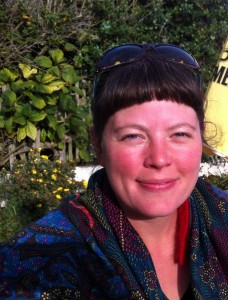Yiota Demetriou is completing a PhD in the Department of Drama researching performative approaches of staging oral history archives and employing media such as sound art, live art, video, photography and installation. Her work facilitates a cross-fertilization between the fields of oral history, performance, philosophy, interaction design, sound art, sound engineering, memory studies, museum, curatorial and archival studies.
I’m on Chapter Five – Conclusions and Findings, and I’m staring intently at the computer screen reluctant to type a word. I realise that finishing this means it is over…What are my conclusions?! What are my findings?! Instead of finishing the chapter, I get distracted with writing this… I’m tearful over my PhD and I have yet to submit it!
I was warned about this from more experienced colleagues. Apparently, it is like overcoming a long and intense relationship before it’s actually over…it may also seem like giving birth and giving the child away…obviously it is not the same, but my project is my baby, my ideas are a part of me, they were nourished inside of me… Does any of this make any sense? Is this why I keep distracting myself, or keep going over and over it, because something, somewhere inside of me doesn’t want it to finish? In a way I’m delaying the process, my project is done and although it is ready to move on, I on the other hand may not be on the same page. I suppose the question to ask is: am I really not ready to move on?! Perhaps I’m scared, as I am used to being part of a rigorous educational framework that makes it difficult for me to step foot in the outside world, that isn’t academia.
Obviously, it’s not over yet – I still have a final push (or several), the viva, the corrections…I’m sure there will be a few. Some days I feel exhausted, other days, I find myself in shock, how could I have possibly come up with all these words – words that actually mean something. I’ve enjoyed my PhD journey, the best years of my life. I have met like-minded people, I’ve been to places, mingled with renowned academics and learnt things that I wouldn’t have imagined learning otherwise.
I do feel tired though. Self-funding a full-time PhD is not an easy process, as you have to constantly self-discipline, four or even five times more than a fully-funded PhD for time management. This of course depends on the person, and it is heightened if you are like myself, fully involved in a range of projects simultaneously (outside the PhD); self-discipline and time management are crucial qualities. However, these are valuable skills definitely worth developing and attaining for any context.
I certainly won’t miss the state of confusion when entering the outside world that follows consecutive days of being locked-in studying and writing. Nevertheless, I’m not the only one, and it is good to meet with other people in the same boat, even if they are not from the same field and support each other, through the process. Most importantly, it is inspiring to see female academics and other fellow PhDers, who are further into the PhD journey, studying for their doctorate alongside being in full-time employment and with children.
Our supervisors, along with the whole department, and our PGR Theatre group, have been supportive all the way. And even though I need to catch a breath and I’m due to embark on an additional journey of stress and anxiety about what I am going to do next with my life, in general, the exhaustion was worth it! I worked hard, in a few jobs, to fund myself through it; I did this for myself so I have no complaints or regrets, I enjoyed every minute of it and I thank those who have helped me through it.
Hopefully this will not form part of my acknowledgments in the actual thesis, but I appreciate all the help that has been given to me: From my friend that gave me a place to stay when I arrived to Bristol as a stranger, on the 5th Dec 2011; to the middle-aged guy who gave me a temporary job at the kebab shop until I got on my feet; my supervisor that took care of my sanity and kept pushing me to expand my ideas as well as keeping me from distracting myself, (which I am doing now, I’m sorry Paul); to the head of our department who has been supporting us all the way; to the amazing PGRT community and friends (most of whom have moved on now) that welcomed and gave me an insight into how things work; and to friends and family who have dealt with my frequent work-related mood swings and tantrums. Bear with me a little longer, I have a final submission date, I’m nearly there!





